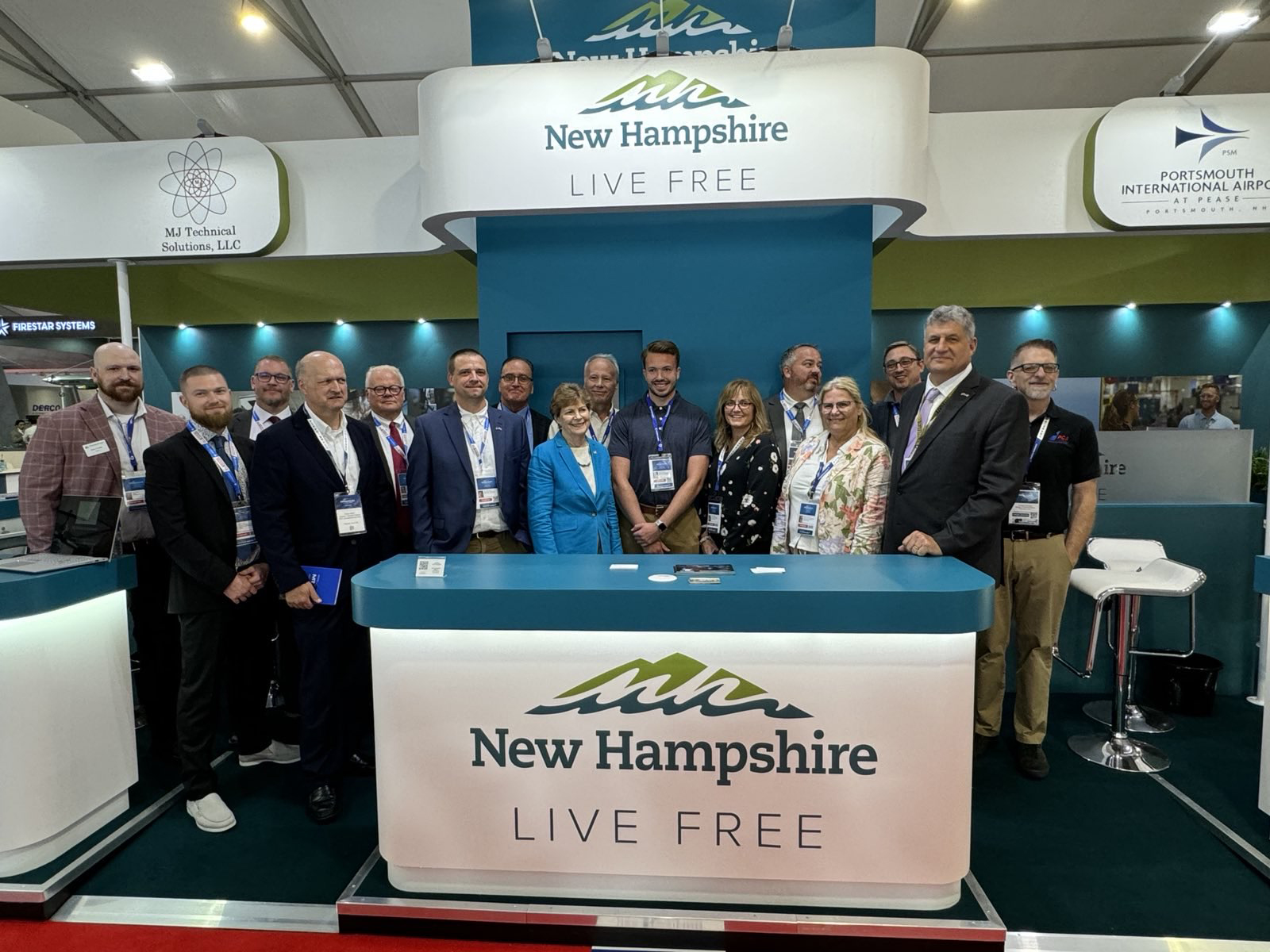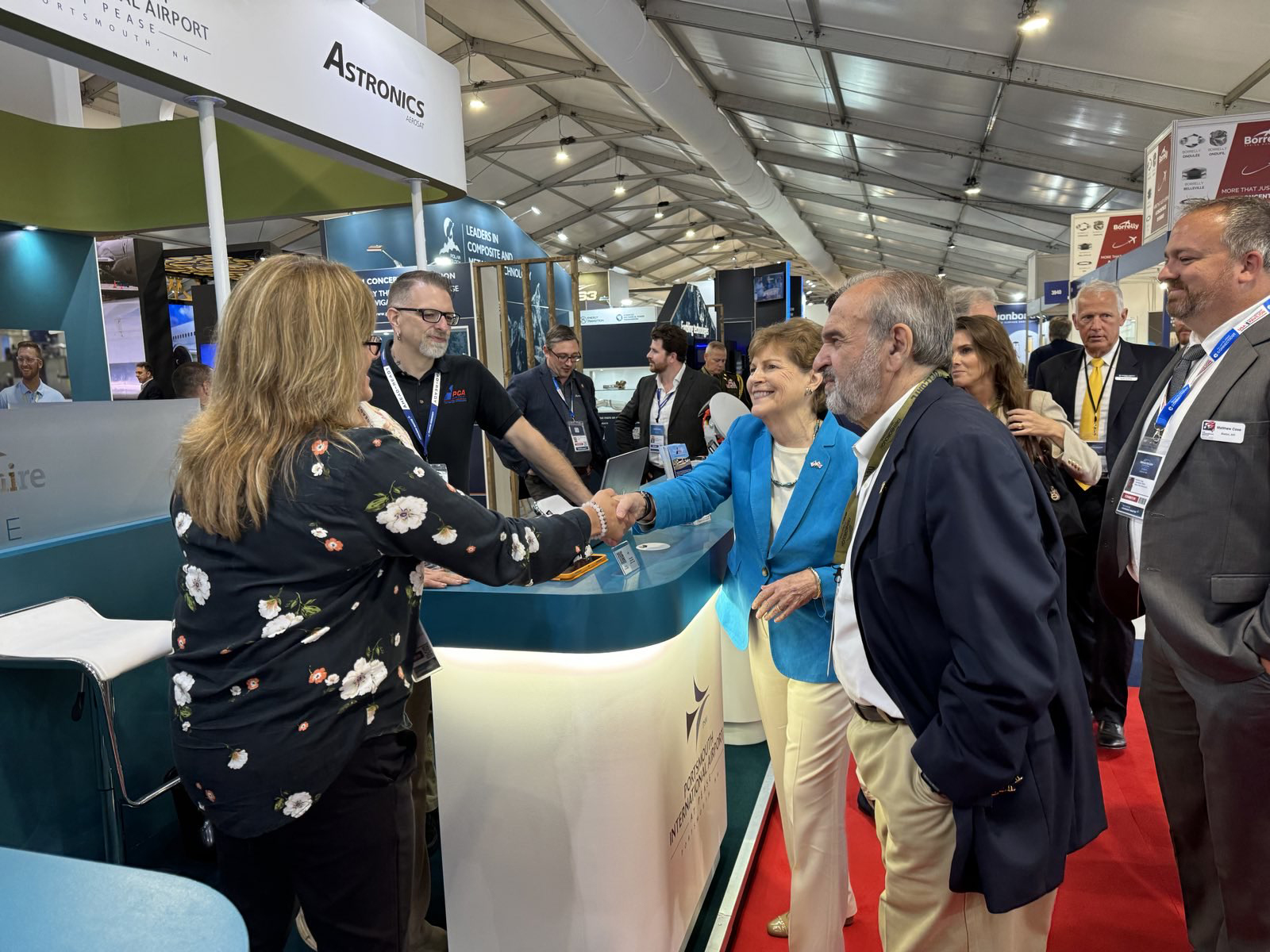Shaheen leads group at U.K. air show to help NH companies gain entry to international markets

U.S. Sen. Jeanne Shaheen (center in blue jacket) led a delegation to the Farnborough International Air Show in July that includes representatives from New Hampshire aerospace companies and government leaders. (Courtesy of Office of Sen. Jeanne Shaheen)
U.S. Sen. Jeanne Shaheen (blue jacket) met with several New Hampshire companies attending the Farnborough International Air Show in July. (Courtesy of Office of Sen. Jeanne Shaheen)
While the aftermath of President Joe Biden’s decision to drop out of the race for reelection was unfolding, U.S. Sen. Jeanne Shaheen, D-NH, was overseas leading a bipartisan delegation to the Farnborough International Air Show with Sen. Jerry Moran, R-Kansas.
The July 22 event, held every two years in Farnborough, Hampshire, England, is a showcase for the aerospace, aviation and defense industries. New Hampshire exhibitors included Vibrac Precision Test Systems and Astronics Aerosat, both of Manchester; MJ Technical Solutions of Bedford; Transupport of Merrimack; and Portsmouth International Airport at Pease.
The International Air Transport Association predicts the aviation industry will record a net profit of $25.7 billion this year, an increase of 9.7%, due to strong revenue from passenger traffic.
The global space market has grown to nearly $447 billion, up from $280 billion in 2010, and is estimated to reach $1 trillion by 2030, the Farnborough International Air Show said on its website, citing a report by McKinsey and World Economic Forum.
New Hampshire exported about $19 million in aerospace products to the United Kingdom in 2023, according to information provided by Shaheen’s office. About 22% of all exports from the state are in the aerospace industry.
“This is a major sector of our economy, and whatever we can do to promote it, to help those small businesses make connections with the bigger suppliers, is really important,” Shaheen said during a phone interview from the air show.
A booth at the show was financed in part by the State Trade Expansion Program, said Shaheen, a program the senator created in 2010 that provides grants to help small businesses to get into international markets.
A lot of small businesses don’t have the financial resources or staffing to break into international markets on their own, said Shaheen, a senior member of the U.S. Senate Appropriations, Armed Services and Foreign Relations committees.
“Coming to things like this air show is a great way to meet lots of big companies and help make some of those connections,” she said.
The New Hampshire participants, which also included the state’s Office of International Commerce, met with several dignitaries including William LaPlante, the undersecretary of defense, who serves as the Defense Department’s procurement officer.
“We also had the U.K. ambassador to the United States here for the air show, who came by and said hello to folks. So that was really helpful for them to make those connections,” Shaheen said.
The senator also visited BAE Systems, the British conglomerate that is New Hampshire’s largest manufacturing employer, and Albany International, a company that is based Rochester, NH, that makes carbon fiber material woven into fan blades to reduce the weight and drag on planes.
“It was really exciting to see that new blade that they’re working on,” Shaheen said.
When asked about the challenges defense contractors face, Shaheen noted the presence of GE at the show. The company employs several hundred workers in Hooksett.
“As you know, we’ve got a big facility in Hooksett that makes jet engines that’s about to undergo an expansion that will be really important, not just to New Hampshire but to the industry,” she said. “And one of the things we talked about there was the kinds of things that they’re doing to address the supply chain challenges and really make their systems more efficient.”
Like other businesses in New Hampshire, defense and aerospace companies face workforce challenges.
“Most of the businesses that I’ve been to since the pandemic have had three issues. They’ve been housing, workforce and child care, so workforce continues to be an issue,” Shaheen said. “Although I asked several of the companies that I visited if that was an issue for them, and they were all very positive. I think the pay and benefits at some of the larger companies helped to offset that so that they’re able to better recruit folks.”